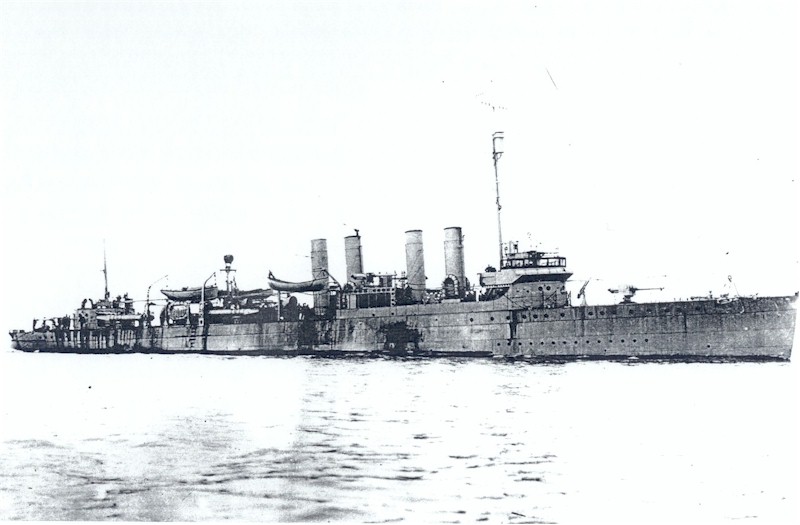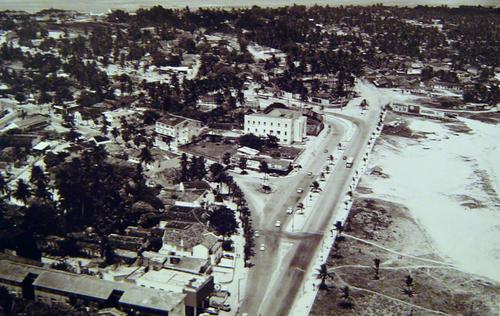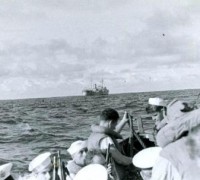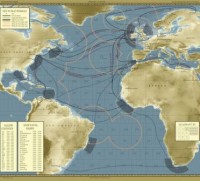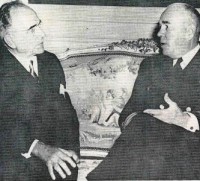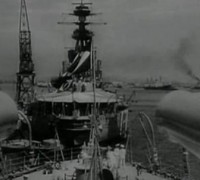- COMMANDER SOUTH ATLANTIC
7)BASING THE MARINES ASHORE
By mid 1941, considerable progress had been made in developing Recife, and the personnel there had increased somewhat. No physical plant as yet existed, and the Office of Naval Observer still consisted of Lieutenant Commander Hodgman, his Officer Assistant, and the Chief Yeoman. However the crew had been slightly augmented by men begged or borrowed from the ships using the port. American Shore Patrols became familiar sight in the streets, and the local authorities learned to accept them.
On December the first 1941, a Chief Storekeeper, O. A. Baribeault, later Lieutenant, reported with orders to establish a Supply Section under the Naval Observer’s supervision. His main work would be to procure dry provisions, warehouse space, fresh provisions as the ships visited port and needed them, and also to obtain and pay for supplies and services the ships required.
Shortly after the beginning of 1942, Chief Baribeault’s staff was increased by the assignment to it of six Storekeepers. Supply problems which hitherto had had to be met by the ships in any way possible, were now turned over to the new department. In the meantime, the Supply Chief also became Acting Pay Clerk.
At Bahia, nothing had as yet been undertaken in the way of development. Lieutenant Saben had one officer to assist him and one Yeoman clerk. They maintained an office in a business building at the corner of Rua da Polonia and Avenida da França. Later the Navy rented 8 rooms, consisting of practically an entire floor, in this same building, but not until the officer personnel had greatly increased. Much later, a signal tower was placed on top of the building for communicating with ships in the harbor and a floating dry dock that arrived early in 1944.
In those early days the work was generally that of straight Naval Intelligence and the cultivation of good relations with local Brazilian authorities. Naval vessels then rarely entered Bahia harbor, because there were no repair facilities and facilities in general were inadequate. Nor was there at first much doing at Natal.
When Lieutenant Commander H.C. Frazer established the Office of Naval Observer there on October 14, 1941, his staff consisted of one officer and one enlisted man. He did not stay long, being relieved on October 28, by Lieutenant L. K. Winans, USNR, who remained until the following March. Originally, the Observer occupied an office consisting of only one room.
The work at first consisted mostly of Communications and liaison activities with local American and Brazilian Officials. Miscellaneous duties resulted from the office’s contact with the Task Force, with a Squadron of Navy planes presently based at Natal, a contingent of Marines arriving in December, and the Seaplane Tenders for the Air Squadron.
Seapane tender Clemson. The same came to Recife to service the seven PBY-5 Catalinas which brought the first Marines to guard the airfields at Belem, Natal and Recife. Picture Curt Clark. The Four Stack APD Veterans.
Though these operations accounted for a greater part of the activity of the Naval Observer’s office, attention was given to provide a framework for foreseeable expansion and to forming a nucleus for the additional personnel expected. Around the end of the year, the Seaplane Tender Clemson, also designated as a Destroyer, reported to the Admiral at Natal as the first unit of the plane force destined to be based there.
Belem furnished nothing of consequence during this period, as the first Naval Observer, Lt. Cmdr. Edward Breed, D-V(G) USNR, only reported on the 17th of November. He first had a room in the US Consulate to serve as an office and did not even obtain a Yeoman until the end of the year.
Thus, Pearl Harbor found the force still based north of Brazil, except for such occasional use as the ships made of the port of Recife. On December 7, the Admiral was cruising in the Memphis off the Cape Verde Islands. At about 1700, while shaving, he received a flash stating that Pearl Harbor was being bombed by Japanese planes.
The radio, which did not come over very satisfactorily, provided few details, though the Admiral did learn that the Oklahoma was on fire and sinking. This was news of a personal nature, since Ensign William Ingram, his son, was then serving aboard the Oklahoma. Few further details could be learned, for three weeks, though it was immediately obvious that the long awaited war with Japan had started.
A few days after Pearl Harbor, the steps were taken that led to the establishment of Shore based marines in Brazil. A high-ranking US diplomatic personage, traveling through the country by air en route to his post in the Eastern Hemisphere, had reason to think the Brazilian airfields did not have adequate security. He seems to have communicated directly with Washington through civilian channels, stating his views and making a recommendation.
At any rate almost immediate dispatches arrived for the Naval Observers at Belem, Natal, and Recife stating that three companies of Marines were leaving Miami at once by plane, bound for these cities. On arrival, the Leathernecks would serve as guards for the local airfields. Lt. Cmdr. Hodgman, US Naval Observer at Recife, at once got in touch with General Mascarenhas de Morais, Commanding of the 7th Military Region of Brazil, as well as Brigadeiro Eduardo Gomes, Commander of the Second Air Zone, in which Recife is located.
These Brazilian Officers had learned something about the impending arrival, but their informant had erred to the extent of saying that a Company of Technicians was on the way. Lt. Cmdr, Hodgman’s revelation of the truth upset them, since they had bargained for no such thing. Were the Marines armed, they demanded to know? Yes, presumably they were, since the purpose for which they were coming would be nullified in they arrived without weapons.
Brigadeiro Gomes, who was and is the most powerful aviation official in Brazil, flatly stated that he would have no armed foreigners at Ibura Field. Ibura, it might be added, is the airport of Recife, used for both civilian and military flying, and is located about six miles from the city.
A thought bestowed on the general nature of the situation will reveal that the Brazilians were more than within their rights here. The United States had become belligerent; Brazil had not. The situation, far from having changed in the Americans’ favor as a result of the declaration of war, had legally swung in the opposite direction. Complying to the strict terms of International Law, the Brazilians authorities were now entitled, even required, to limit each US warship entering their ports to a stay of 24 hours. They had not done so; revealing by this leniency their friendliness and desire to cooperate.
However, it was another thing to expect them to permit American Marines, bearing arms, to set up in Brazilian territory. Lieut. Cmdr. Hodgman thoroughly appreciated the correctness of their position, yet was obligated to smooth over the situation and to secure as much of a concession as he could.
Time was of the essence, since the Marines would enter Brazil in a day or two. Meanwhile, wires came from both the US Naval Attaché in Rio, Rear Admiral A. T. Beauregard, and from the Ambassador, Mr. Jefferson Caffery, both aware that there was something queer about the situation and both demanding to know details.
The facts were these. Three Provisional Companies of Marines, the 17th, 18th, and 19, using seven planes, would arrive at Belem on December19. The 17th was ordered to remain there for guard duty, while the other flew to Natal. There the 18th company would stay, while the 19th continued on to Recife, where it would be quartered. Since the question of the arms was the important one, the Naval Observer arranged a compromise. Before entering Brazilian territory, the Marines should stop long enough to box their arms, which might then continue the journey with the men.
The rifles would be placed aboard the Patoka, scheduled to be in Recife Harbor on December 18. So it was settled. The Marines stopped long enough at Trinidad to crate their rifles, and entered Brazil in an inoffensive capacity. The 17th Company remained at Belem, the 18th at Natal, and the 19th went on to Recife, arriving there on December 20.
The subsequent history of the Marines at Recife is interesting. At first they lived on the Patoka with their boxed arms. The Brazilian officers feared that this new unaccustomed American uniform would alarm the populace.
To overcome local worries by degrees, the men were allowed liberty in installments. In a short time they became a familiar sight in Recife, and the inhabitants accepted their presence as normal. Then, on January 6, 1942, the Patoka left port, and the question of what to do with the men and guns had to be faced again.
The crowded naval Observer 1s office provided temporary storage for the arms, and the Marines, numbering 3 officers and 46 men, were transferred to the Central Hotel, perhaps the third best hostelry in the city.
There were still no barracks available, but at Boa Viagem, the principal suburb of the city, a beach residential section, there was a building called the Casino and quartered the Marines there with their firearms, though the understanding was that the rifles should not be taken outside the compound.
The Casino Americano, the building that headquartered the Marines at Recife. Later it was converted into a Navy Dispensary having been visited by Mrs. Eleanor Roosevelt.
Oiler Patoka where the Marines stayed provisory at Recife.
.jpg)
Central Hotel, the first cantonment for US Marines at Recife.
Next the Marines were used as shore patrol in the downtown parts of the city, armed only with truncheons. Gradually the Brazilian citizens grew accustomed to them in this new capacity and they became an established part of the picture. After a time they were allowed to guard the US planes at Ibura Field, armed, and could drill with their rifles, when not standing guard. Finally in August 1942, when Brazil declared war on Germany and Italy, almost all the last restrictions were removed.
The Brazilian generals then required that the Marines be used to aid in guarding Ibura. Moreover the field was now undergoing rapid development, and the construction included the building of barracks, one of them for the Marines. As soon as possible they shifted to these and settled down for the remainder of their stay in Brazil, which lasted until April 1944.
HyperWar - Commander South Atlantic Force. U.S. Naval Administration in WW II
